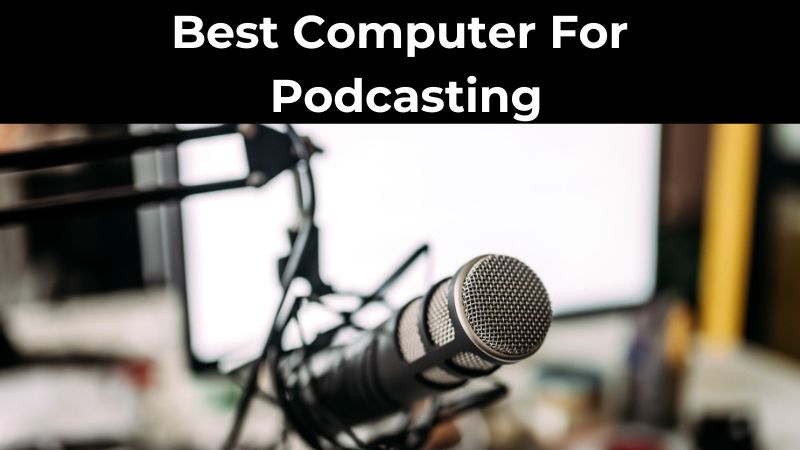
In the world of podcasting, having the right computer is like finding the perfect studio. It’s where creativity flows, and ideas become amazing episodes. A podcasting computer has three important features that make your audio experience better.
- CPU: It is the powerhouse, ensuring seamless operation, swift data processing, and effortless multitasking. Think of it as the conductor orchestrating your podcasting symphony, ensuring every element harmonizes seamlessly.
- RAM & Storage: RAM enables smooth operation of resource-intensive applications and facilitates the lightning-fast switching between tasks. With generous RAM, your creativity flows without interruption, allowing you to focus solely on crafting engaging content. Storage, the silent guardian of your podcasts. An organized vault where your audio files, scripts, and multimedia assets are securely stored. It also provides the necessary space for your podcasting endeavors to flourish.
- Graphics Card: It enhances your visual experience. Good graphics make pictures and videos clear and smooth. They help podcasts look great, making editing easier and your content better. Whether crafting visually rich episodes or editing high-definition videos, a robust graphics card provides the horsepower needed to bring your video podcasting visions to life.
Let’s dive into the best picks designed just for you. They fulfill the basics, making your podcasting experience smooth and enjoyable. Discover expert insights in the “Buying Guide” helping you choose the perfect podcasting companion tailored to your needs.
Best Computer for Podcasting List
Best Computer for Podcasting Reviews
1. Apple Computer for Podcasting
The Apple 2023 Mac Mini, for podcasters, supercharged by the M2 Pro chip, offering an astounding 40% increase in speed, ideal for intricate podcast editing and rendering tasks. Its configuration, with up to a 12-core CPU and 19-core GPU, places it among the most powerful devices in the Apple lineup, ensuring seamless performance even during the most demanding podcasting sessions.
With a 32GB of unified memory, multitasking becomes effortless, allowing podcasters to manage recording software, editing tools, and various applications. The Mac Mini has speedy storage. It quickly opens your podcast episodes, files, and apps, saving you time and helping you work better. Connectivity is easy with Thunderbolt 4 ports, two USB-A ports, HDMI, Wi-Fi 6E, Bluetooth 5.3, Gigabit Ethernet, and a headphone jack. These options facilitate easy integration of microphones, external storage, and other podcasting peripherals, enabling a seamless podcasting setup.
In the realm of security, the Mac Mini excels, incorporating advanced features like the Secure Enclave and built-in malware protections, ensuring the safety of podcast files and sensitive data. Moreover, its user-friendly design simplifies the podcasting process from setup to operation. Paired with the Apple Studio Display, the Mac Mini delivers a visually stunning experience, enhancing the overall podcasting environment.
Best Features:
- Up to 32GB unified memory.
- Supports up to 19-core GPU.
- Built-in protections.
- Easy-to-navigate interface.
- Seamlessly pairs with Apple accessories.
- Power-efficient performance.
- Space-saving.
- Supports a wide range of optimized software.
- Runs quietly.
- Efficient M2 Pro Chip.
Pros:
- Efficient unified memory and advanced GPU capabilities.
- Industry-leading security features.
- Seamless compatibility with Apple accessories.
- Energy-efficient design suitable for long podcasting sessions.
- Sleek, space-saving, and quiet operation.
Cons:
- Limited customization options for hardware upgrades.
2. iBUYPOWER Computer for Podcasting
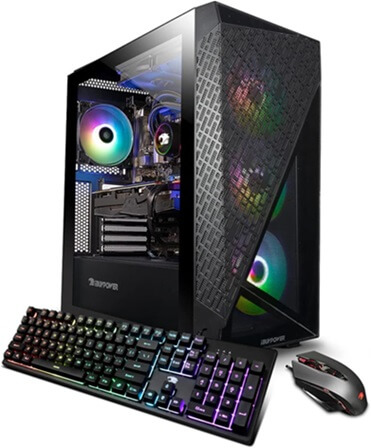 iBUYPOWER emerges as a powerhouse tailored for podcasters, offering unmatched versatility. Its core strength lies in the AMD Ryzen 7-7700X processor, an 8-core with a clock speed of up to 4.5GHz, ensuring smooth handling of even the most demanding podcasting tasks. Backing this with RTX 4070 graphics card, capable of rendering audio-visual content with remarkable clarity and precision. It has vast connectivity options like 6 x USB 3.1, 1x RJ-45 Network Ethernet 10/100/1000. Visuals make podcasts better! If you use pictures or videos, this computer helps a lot. It makes your podcasting experience much cooler and more enjoyable for your listeners.
iBUYPOWER emerges as a powerhouse tailored for podcasters, offering unmatched versatility. Its core strength lies in the AMD Ryzen 7-7700X processor, an 8-core with a clock speed of up to 4.5GHz, ensuring smooth handling of even the most demanding podcasting tasks. Backing this with RTX 4070 graphics card, capable of rendering audio-visual content with remarkable clarity and precision. It has vast connectivity options like 6 x USB 3.1, 1x RJ-45 Network Ethernet 10/100/1000. Visuals make podcasts better! If you use pictures or videos, this computer helps a lot. It makes your podcasting experience much cooler and more enjoyable for your listeners.
This has 32GB of RAM, making it easy to do many things at once. For podcasters, this means you can use big programs without any problems. You can easily edit audio, use recording software, and add plugins. This makes your work smooth and helps you get more done. The inclusion of a high-capacity 2TB NVMe SSD ensures rapid access to podcast episodes, software tools, and multimedia files. This makes your work faster and easier. You can edit and create without waiting for things to load.
Encased in a sleek tempered glass RGB gaming case, it adds a touch of style to your workspace, creating an inspiring environment for podcasting. The 16-color RGB lighting further enhances the aesthetic appeal, creating a visually engaging setup. It includes a complimentary iBuyPower gaming keyboard and RGB gaming mouse, offering comfortable input solutions for podcasters. With a 1-year parts and labor warranty, coupled with free lifetime US tech support.
Best Features:
- 32GB DDR5 RAM smooth multitasking.
- Powerful AMD Ryzen 7-7700X Processor.
- NVIDIA GeForce RTX 4070 Graphics Card.
- 2TB NVMe SSD for storage space.
- Tempered Glass RGB Gaming Case.
- 6 x USB 3.1, 1x RJ-45 Network Ethernet 10/100/1000
- Free iBuyPower Gaming Keyboard & Mouse.
- Clean system without unnecessary software.
- 1-Year Warranty & Reliable customer service.
Pros:
- Handles multiple apps without lag.
- Quick startup and efficient software loading.
- High-quality visuals for gaming and editing.
- Attractive gaming case with customizable lighting.
- Comes with free gaming keyboard and mouse.
Cons:
- Fans Can Be Noisy under heavy loads.
3. Cooler Master Computer for Podcasting
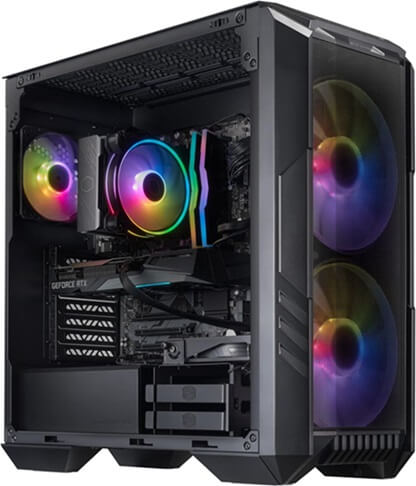 Cooler Master HAF 5 Pro emerges as an exceptional choice for podcasters, offering a robust foundation for seamless content creation. Powered by the Intel Core i7-12700F processor, this PC ensures swift audio processing and effortless multitasking. Its 12 cores and 20 threads, reaching speeds of up to 4.9GHz, guarantee efficient handling of complex audio editing software. The NVIDIA GeForce RTX 3060 graphics card, not only enhances the visual aspects but also accelerates software rendering, crucial for podcasters working with intricate audio and video files.
Cooler Master HAF 5 Pro emerges as an exceptional choice for podcasters, offering a robust foundation for seamless content creation. Powered by the Intel Core i7-12700F processor, this PC ensures swift audio processing and effortless multitasking. Its 12 cores and 20 threads, reaching speeds of up to 4.9GHz, guarantee efficient handling of complex audio editing software. The NVIDIA GeForce RTX 3060 graphics card, not only enhances the visual aspects but also accelerates software rendering, crucial for podcasters working with intricate audio and video files.
Memory management is streamlined with 16GB of DDR4 RAM, ensuring smooth operation of multiple applications simultaneously. The 1TB M.2 NVMe SSD complements this by offering rapid access to podcast episodes, sound effects, and editing tools, boosting overall workflow efficiency. It also includes essential peripherals like the Cooler Master HAF 500 case, optimized for excellent airflow to keep the system cool during long recording sessions. A Hyper 212 Halo tower CPU cooler maintains optimal temperatures, while the G600 600W 80+ Gold efficiency power supply unit ensures stable performance.
Connectivity options, including Wi Fi, Bluetooth,1x HDMI & 2x Display Port, USB Ports, HD Audio & Mic, facilitate seamless integration of external recording devices and audio interfaces. Although priced higher, its top-tier components are tailored to meet the demands of podcasters seeking a reliable, high-performance solution.
Best Features:
- Powerful Intel Core i7-12700F processor
- NVIDIA GeForce RTX 3060 graphic card
- 16GB DDR4 RAM
- Wi Fi, Bluetooth,1x HDMI & 2x Display Port, USB Ports, HD Audio & Mic
- 1TB M.2 NVMe SSD
- Efficient cooling system with Hyper 212 Halo tower CPU cooler
Pros:
- Seamless handling of complex audio editing software
- Swift access to podcast episodes and editing tools
- Stable performance during long recording sessions
Cons:
- Large tower size requires more desk space.
4. Acer Computer for Podcasting
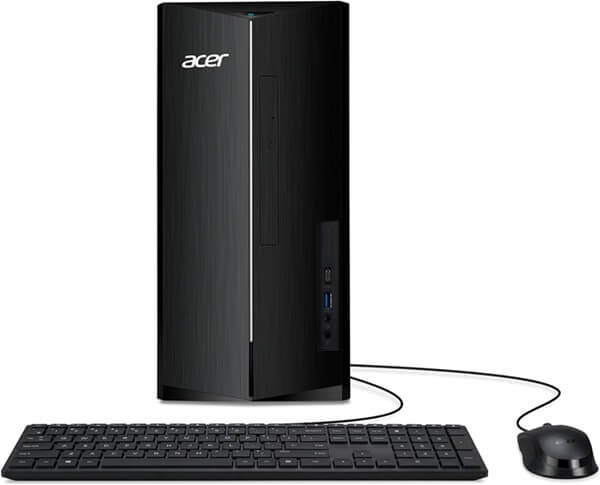 Acer Aspire, offering a seamless blend of power and convenience. Driven by the Intel Core i7-12700F 12-core processor and coupled with an NVIDIA GeForce GTX 1660 SUPER graphics card, it excels in podcasting tasks, ensuring smooth audio editing and recording experiences. Its 16GB of DDR4 RAM and swift 512GB M.2 NVMe SSD enhance podcasters’ workflow, enabling effortless multitasking and rapid access to editing software. Connectivity is a highlight, featuring Intel Wi-Fi 6 AX201 and Bluetooth 5.2, ensuring stable wireless connections and seamless pairing with peripherals, such as microphones and headphones.
Acer Aspire, offering a seamless blend of power and convenience. Driven by the Intel Core i7-12700F 12-core processor and coupled with an NVIDIA GeForce GTX 1660 SUPER graphics card, it excels in podcasting tasks, ensuring smooth audio editing and recording experiences. Its 16GB of DDR4 RAM and swift 512GB M.2 NVMe SSD enhance podcasters’ workflow, enabling effortless multitasking and rapid access to editing software. Connectivity is a highlight, featuring Intel Wi-Fi 6 AX201 and Bluetooth 5.2, ensuring stable wireless connections and seamless pairing with peripherals, such as microphones and headphones.
Windows 11 Pro comes pre-installed, enhancing productivity with its modern interface and productivity features. The desktop’s array of ports, including USB 3.2 Type C, USB 3.2 Gen 1, HDMI, Display Port, and DVI, offers flexibility in connecting essential podcasting equipment, such as external sound cards and monitors. It includes a USB keyboard and mouse, providing a complete setup for podcasters right out of the box.
This stands as an ideal podcasting companion, combining robust processing power, efficient multitasking capabilities, seamless connectivity, and user-friendly features. Podcasters can trust this desktop to enhance their audio editing, recording, and content creation endeavors.
Best Features:
- Intel Core i7-12700F processor
- NVIDIA GeForce GTX 1660
- 16GB DDR4 RAM
- 512GB M.2 NVMe SSD
- Intel Wi-Fi 6 AX201 and Bluetooth 5.2
- Pre-installed Windows 11 Pro.
Pros:
- Rapid access to applications and smooth multitasking.
- Wide range of ports for diverse external devices.
- Inclusive keyboard and mouse for immediate use.
- Windows 11 Pro enhances productivity with its user-friendly interface.
Cons:
- Limited storage, may require additional space.
5. Alienware Computer for Podcasting
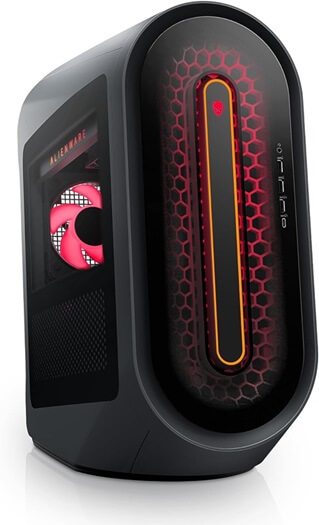 Alienware Aurora R15 is a podcasting powerhouse. Fueled by the AMD Ryzen 7-7700X processor and NVIDIA GeForce RTX 4070 Ti graphics card, this desktop ensures a seamless podcasting experience. With 16GB of DDR5 RAM and a capacious 1TB NVMe M.2 PCIe SSD, it offers good memory and storage for podcast editing, hosting, and storing multimedia files. This excels in handling podcast editing software and hosting platforms. Its revamped airflow and cooling system guarantee a quiet recording environment. The inclusion of NVIDIA RTX ray tracing and DLSS 3 that make videos look good when you edit them for your podcast.
Alienware Aurora R15 is a podcasting powerhouse. Fueled by the AMD Ryzen 7-7700X processor and NVIDIA GeForce RTX 4070 Ti graphics card, this desktop ensures a seamless podcasting experience. With 16GB of DDR5 RAM and a capacious 1TB NVMe M.2 PCIe SSD, it offers good memory and storage for podcast editing, hosting, and storing multimedia files. This excels in handling podcast editing software and hosting platforms. Its revamped airflow and cooling system guarantee a quiet recording environment. The inclusion of NVIDIA RTX ray tracing and DLSS 3 that make videos look good when you edit them for your podcast.
Podcasters benefit with the multitasking capabilities. Running editing software, recording tools, and background applications simultaneously. Its 12% quieter operation than the previous model ensures clear audio recordings without distractions. This computer helps you do podcast stuff faster, like editing episodes and streaming shows. This computer is great for doing lots of work without any problems. It looks cool too, making your podcast setup look professional.
The front ports of this computer include a headphone/line out, two USB 3.2 Gen 1 ports, and a USB 3.2 Gen 2 Type-C. At the rear, it offers various ports such as surround outputs, microphone in, and multiple USB options including Gen 2 Type-C and Type-A, accommodating a range of devices for seamless connectivity. Its blend of power, efficiency, and aesthetics makes it an ideal choice for podcasters.
Best Features:
- Powerful Performance that handles demanding tasks smoothly.
- Supports NVIDIA RTX ray tracing and DLSS 3 for excellent visuals.
- Improved airflow and quieter operation.
- Legend 2.0 design adds a professional touch.
Pros:
- Handles editing and streaming without lags.
- Enhances video editing with advanced graphics support.
- Efficient cooling system ensures quiet operation.
- Sleek design adds a touch of sophistication to your setup.
Cons:
6. Skytech Gaming Computer for Podcasting
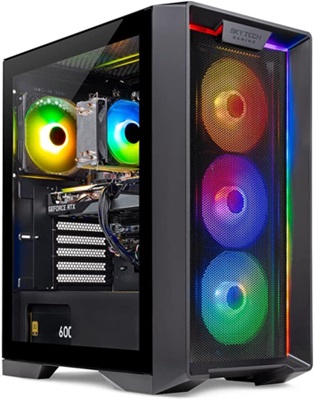 Skytech Nebula, a solution tailored for podcasters seeking power and versatility. Driven by the latest Intel Core i5-13400F processor and NVIDIA GeForce RTX 3050 graphics card. Its 16GB of DDR4 RAM ensures seamless multitasking, allowing hosts to manage recording software, edit audio files, and handle various plugins without a hitch. With a blazing-fast 1TB NVMe SSD, the Nebula accelerates system and application start-up times, ensuring swift access to podcast episodes, files, and editing software. Managing extensive media libraries becomes effortless, enhancing productivity and workflow efficiency.
Skytech Nebula, a solution tailored for podcasters seeking power and versatility. Driven by the latest Intel Core i5-13400F processor and NVIDIA GeForce RTX 3050 graphics card. Its 16GB of DDR4 RAM ensures seamless multitasking, allowing hosts to manage recording software, edit audio files, and handle various plugins without a hitch. With a blazing-fast 1TB NVMe SSD, the Nebula accelerates system and application start-up times, ensuring swift access to podcast episodes, files, and editing software. Managing extensive media libraries becomes effortless, enhancing productivity and workflow efficiency.
Whether you’re editing, streaming, or doing many things at once, it keeps everything smooth. You can concentrate on creating without any problems. It guarantees lag-free streaming, enabling hosts to connect with their audience seamlessly. The inclusion of NVIDIA’s DLSS AI technology enhances visual quality, elevating video content for viewers. It includes a HDMI and one Display Port for video, USB 2.0, 3.0, and 3.2 Gen1 ports, as well as HD audio and mic connections, ensuring versatile connectivity options.
It features an unlocked processor for performance customization and RGB lighting fans ensuring optimal airflow. Its mid-sized tower fits seamlessly into any setup, exuding both power and style. Operating quietly in the background, this PC allows podcasters to focus on their discussions without disturbances. From swift multitasking to efficient streaming and content creation, it offers a seamless environment for podcasters to thrive. Its blend of power, efficiency, and style makes it an ideal choice for those aiming for professional-quality podcasts.
Best Features:
- Intel Core i5-13400F
- NVIDIA GeForce RTX 3050
- 16GB RAM, 1TB NVMe SSD.
- Ideal for live streaming with a fast processor and dedicated graphics.
- HDMI and one Display Port for video, USB 2.0, 3.0, and 3.2 Gen1 ports
- High settings at 60fps/1080p for gaming and content creation.
- Four RGB fans ensure optimal temperature management.
Pros:
- Smooth Performance.
- Perfect for live shows and online content streaming.
- Provides high-quality visuals for gaming and video editing.
- Effective Cooling.
Cons:
- Limited expansion options for future upgrades.
7. CYBERPOWERPC Computer for Podcasting
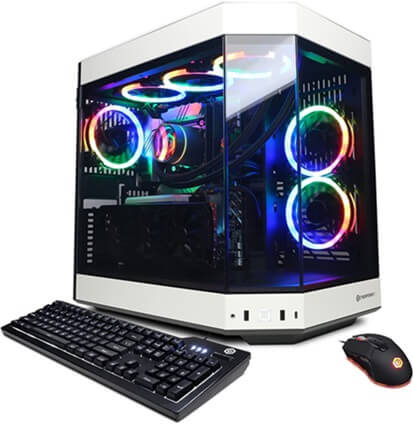 CyberPowerPC, a premier choice for podcasters, offering exceptional performance and versatile capabilities. Driven by the latest Intel Core i9-13900KF processor and NVIDIA GeForce RTX 4070 Ti graphics card. This computer makes editing podcasts super easy. It can also handle tough jobs like editing videos and 3D graphics without any problems. Its 16GB DDR5 RAM and rapid 1TB NVMe PCIe SSD enable swift multitasking and quick access to podcast episodes and editing software. It has 1 HDMI and 2 Display Ports for video, along with 6 USB 3.1, 2 USB 2.0, Ethernet, Wi-Fi, and 7.1 Channel audio, ensuring comprehensive connectivity.
CyberPowerPC, a premier choice for podcasters, offering exceptional performance and versatile capabilities. Driven by the latest Intel Core i9-13900KF processor and NVIDIA GeForce RTX 4070 Ti graphics card. This computer makes editing podcasts super easy. It can also handle tough jobs like editing videos and 3D graphics without any problems. Its 16GB DDR5 RAM and rapid 1TB NVMe PCIe SSD enable swift multitasking and quick access to podcast episodes and editing software. It has 1 HDMI and 2 Display Ports for video, along with 6 USB 3.1, 2 USB 2.0, Ethernet, Wi-Fi, and 7.1 Channel audio, ensuring comprehensive connectivity.
This computer is great for people who make stuff online. It stays cool with special liquid cooling, and it connects to the internet easily for live streams or working together with others. This computer looks cool! It has special glass and colorful lights that make it look nice. It will make your podcasting area look really professional. This computer uses Windows 11 Home 64-bit. It’s easy to use and makes podcasting better! You also get a handy USB keyboard and a colorful RGB mouse in the package. They make your workspace cool and easy to use!
The computer is fast and looks good, but there might be a storage limit. Some users find the 1TB storage a bit small if you have lots of files. Additionally, extended podcasting sessions might lead to increased fan noise, impacting the recording environment. It offers assurance with a 1-year parts and labor warranty and free lifetime tech support, emphasizing its commitment to customer satisfaction.
Best Features:
- High-performance Intel Core i9-13900KF processor
- Powerful NVIDIA GeForce RTX 4070 Ti graphics card
- 16GB DDR5 RAM for smooth multitasking
- Fast 1TB NVMe PCIe SSD storage
- Liquid cooling for efficient temperature management
- Stylish 3-piece panoramic tempered glass case with custom RGB lighting
- Includes USB keyboard and 7-color RGB mouse
Pros:
- Runs latest games at ultra settings
- Efficient for streaming and content creation tasks
- Stylish design with customizable RGB lighting
Cons:
- Relatively high power consumption during intensive tasks.
Buying Guide For Best Computer for Podcasting
1. CPU
The CPU, is crucial for podcasting tasks. Computers for podcasting use advanced CPUs like Intel Core i7 or i9, and AMD Ryzen series. It also includes the M2 pro chip which supports the Apple Mini. These CPUs handle complex audio editing, ensuring smooth recording and editing experiences. A powerful CPU enables seamless multitasking, allowing podcasters to run editing software, manage recordings, and handle plugins simultaneously. High-end CPUs enhance efficiency, making podcast creation more streamlined and enjoyable.
2. RAM & Storage
RAM and storage are vital components in podcasting computers. The Apple desktops consists of unified memory. RAM (Random Access Memory) determines the computer’s multitasking ability. Computers with 16GB or 32GB RAM can smoothly handle audio editing software and various applications simultaneously. Storage, like SSDs (Solid State Drives), provides fast data access, crucial for quick podcast episode loading. There are different RAM types like DDR4 and DDR5, each offering various speeds. SSDs are preferred over HDDs due to their speed; NVMe SSDs, in particular, deliver swift performance. Sufficient RAM and fast SSD storage ensure podcasters work efficiently, creating high-quality content without slowdowns.
3. Graphic Card
The graphics card, impacts visual performance in podcasting computers. While podcasting primarily involves audio, a decent GPU ensures smooth video editing and rendering tasks. Different types, like NVIDIA GeForce and AMD Radeon, offer varying levels of performance. GPUs with higher VRAM (Video RAM) handle graphics-intensive tasks efficiently. While not the primary focus in podcasting setups, a capable graphics card contributes to seamless multimedia editing, enabling podcasters to create engaging content with ease.
4. Cooling Type
Cooling systems are crucial in podcasting computers to prevent overheating during intensive tasks. There are various types, such as air cooling and liquid cooling. Air cooling uses fans to circulate air and dissipate heat, while liquid cooling employs a liquid coolant to absorb heat from components. Liquid cooling is more efficient and quieter but requires careful maintenance. A proper cooling system ensures the computer runs smoothly, maintaining performance and longevity, allowing podcasters to work on projects without the risk of overheating-related issues.
5. Operating System
The operating system (OS) is important for a podcasting computer, controlling all activities. Common OS options include Windows, macOS, and Linux. Windows is widely used, offering a user-friendly interface and extensive software compatibility. macOS, exclusive to Apple devices, is popular among creative professionals, known for its sleek design and stability. Linux, an open-source OS, is favored by tech enthusiasts for its customization and security. Choosing the right OS ensures seamless podcasting tasks, providing a platform where software runs smoothly, enhancing efficiency and creativity without interruptions.
6. Connectivity Ports
The connectivity ports in a podcasting computer are vital for seamless operations. USB ports, both standard (USB 2.0/3.0) and modern (USB-C), allow easy connection to external devices like microphones and cameras. HDMI and DisplayPort enable high-quality video output, essential for video podcasting or presentations. Ethernet ports provide stable internet connectivity, crucial for online research and collaboration. Wi-Fi ensures wireless internet access, allowing flexibility in workspace setup. Bluetooth facilitates wireless connection to peripherals like headphones and speakers. Having diverse ports ensures compatibility with various devices, enhancing a podcaster’s ability to integrate tools efficiently, making the podcasting process smoother and more versatile.
Computer for Podcasting – FAQs
Ans: Podcasters need a high RAM. You want your computer to be able to handle and store as much information as possible at once. A higher RAM means your computer will be able to process multiple audio tracks, editing software, and more with no problem. Podcasters should look for at least 8GB of RAM.
Ans: Podcasters require only a computer, microphone, headphones, and recording software to create audio content for listeners to enjoy. In fact, you probably already have some of the equipment needed to create a podcast.
Ans: Most podcast editing software is compatible with both Mac and PC operating systems. Popular options like Podcastle, Audacity, and Adobe Audition offer versions for both platforms, so you can choose the one that best suits your computer setup.
Ans: A PC or laptop with a camera, mic and audio. Appropriate software to record your session. A quiet space to prepare with good lighting and sound.
Ans: Both platforms work well for podcasting. Macs are known for their multimedia capabilities, while Windows PCs offer a wider range of software options. Choose based on your familiarity and preference.
Conclusion
In the dynamic world of podcasting, the quest for the ideal computer is essential. The journey to find the best computer for podcasting involves navigating through various specifications and features, each playing a vital role in enhancing the creative process. From powerful CPUs and ample RAM to advanced graphics cards and efficient cooling systems, every element contributes to a seamless podcasting experience. Evaluating the diverse options available, podcasters seek a balance between performance, reliability, and user-friendliness. In this pursuit, understanding the significance of each component empowers podcasters to make informed decisions, ensuring their digital studio is optimized for creativity and innovation.
- The Apple Computer for Podcasting is a powerhouse, powered by the M2 Pro chip with a 10-core CPU and 16-core GPU, offering lightning-fast performance for demanding tasks. With up to 32GB unified memory and up to 8TB SSD storage, it ensures smooth multitasking and efficient handling of large files. Equipped with Thunderbolt 4 ports, USB-A ports, HDMI port, Wi-Fi 6E, and Bluetooth 5.3, it offers versatile connectivity options. It’s an overall powerhouse for your creative endeavors.
- The iBuyPower Computer for Podcasting, offers storage supremacy with its 2TB NVMe SSD. This powerhouse features an AMD Ryzen 7-7700X processor, Nvidia GeForce RTX 4070 12GB graphics, and 32GB DDR5 RAM, ensuring seamless performance for podcasting and gaming. With a sleek RGB gaming case, Wi-Fi, and free gaming accessories, it’s an all-in-one solution for your creative and entertainment needs.
- The Skytech Computer for Podcasting is a budget-friendly powerhouse for podcasting. Its Intel Core i5 processor, NVIDIA RTX 3050 graphics, and 1TB NVME SSD ensure smooth performance. With 16GB RAM and Windows 11, it handles multitasking effortlessly. Equipped with 4 RGB fans, it’s not only efficient but visually appealing. Plus, it comes with a free gaming keyboard and mouse. Perfect for podcasting and gaming on a budget.
Credit : Source Post






